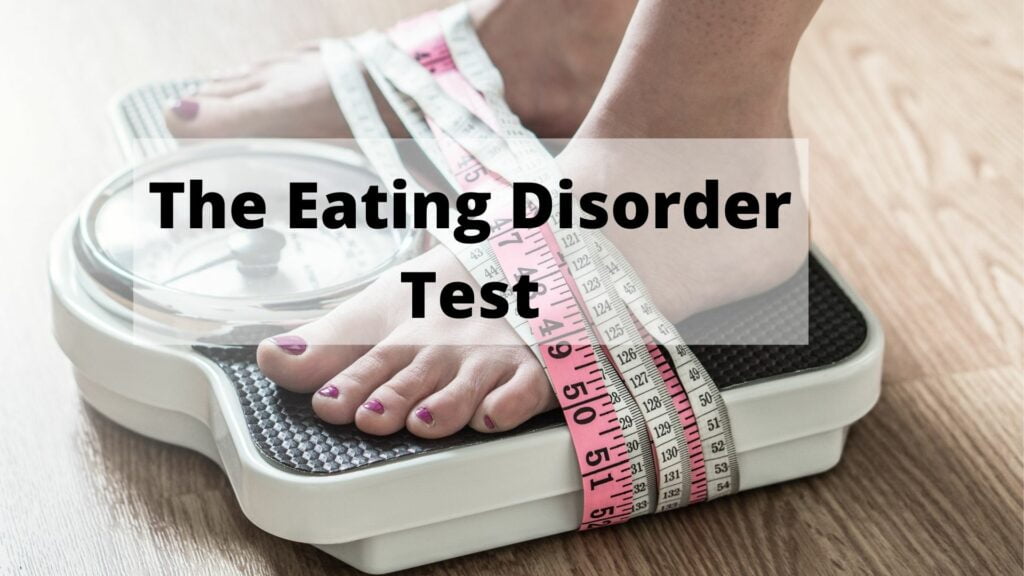Eating Disorder Test
Do you have a tendency to overeat? Do you ever feel bad after you eat? To avoid gaining weight, do you skip meals or consume a lot of diet soda? Has your family or friends expressed concern about your eating habits? If you answered yes to either of these questions. Then this eating disorder test is for you! This questionnaire will help you decide if the above actions are constant. After that, there is an unhealthy attachment to eating. Once we’ve determined whether or not you have an eating disorder. We can begin devising a strategy to get it under control.
Contents
What Are Eating Disorders?
Eating disorders are mental conditions that affect your eating habits. However, they can be brought on by a multitude of factors. Depression, anxiety, and stress are the most common symptoms.
It is critical to notice these indicators early because if they are not treated. Therefore they can lead to serious consequences. They have the potential to cause a slew of health issues in the future. Eating disorders frequently occur in conjunction with other mental problems. Anxiety or obsessive-compulsive disorder are examples (OCD). Therefore, this makes it more difficult to deal with them.
Types Of Eating Disorders

Anorexia nervosa, bulimia nervosa, and binge-eating disorder are all examples of eating disorders. The three most common types of eating disorders are listed below.
Anorexia Nervosa
It’s a psychological condition. In this state of chaos. People have a strong aversion to acquiring weight. Their entire existence revolves around staying skinny and losing weight. Even if they’re severely underweight. They frequently deprive themselves of food in order to reduce weight and seem slim.
Bulimia
People with bulimia have disordered eating patterns. This involves either bingeing or purging after overeating. This can be by self-induced vomiting. One can also use laxatives to get rid of the food from their bodies before it has been digested.
Binge Eating
Binge-eating disorder involves frequent episodes where you eat large amounts of food. One may feel out of control during these binges. Some people with binge-eating disorder also use inappropriate compensatory behavior. This includes self-induced vomiting. To avoid gaining weight. This often leads to bulimia.
Risk Factors Of Eating Disorders
There are several risk factors for eating disorders. This includes:
- Eating disorders are more common in those who have relatives or siblings with eating issues.
- Individuals who are recovering from an eating disorder usually have a history of anxiety, melancholy. They may also have obsessive-compulsive behavior.
- Starvation and dieting. Starvation is a risk factor for eating problems. Anxiety, rigidity in thinking, and hunger are all affected by starvation. There’s a lot of evidence that many of the signs of an eating problem are signs of starvation.
- Change might bring tension. This can raise your risk of an eating problem. Whether it’s going to college, relocating. Other reasons may include getting new employment or dealing with a family or relationship issue.
How To Identify Eating Disorder?
One can take self-assessment tests. This includes eating disorder tests or quizzes. It is to find out if they are suffering from this disorder. These quizzes and tests are usually free. They also may charge a small amount.
However. One should not rely solely on this test as it is not accurate. Talk to a mental health professional. They will be able to provide an accurate diagnosis.
What Is An Eating Disorder Test?

An eating disorder test is an online tool. Through this people can assess themselves if they are suffering from this disorder or not. You may take this eating disorder test to learn more about your eating habits. This may also tell you whether you show signs of an eating disorder or not.
Who Should Take This Eating Disorder Test?
This quiz is not an official diagnosis of your eating disorder.
Instead, it’s a tool to help you understand how concerned you should be about certain symptoms. Therefore, this may help you whether or not they warrant further investigation by yourself. Family members, friends, or medical professionals may use it too.
The Eating Disorder Quiz was created in conjunction with some of the professional colleagues at McLean Hospital in Belmont Massachusetts (USA). They are experts in eating disorders treatment and research.
Sample Questions For Eating Disorder Test
Do you eat in secret? Do you make yourself vomit after eating? When was the last time you ate in front of others and enjoyed it? How often do you exercise to burn off calories from a meal or snack? Even though you feel uncomfortably full. Do long periods of fasting been part of your normal routine since becoming an adult? Take this test to find out if you suffer from an eating disorder.
I have unique eating habits. They differ from those of my relatives and friends.
- Often
- Sometimes
- Rarely
- Never
I’m constantly concerned about what I’ll eat or not eat throughout the day.
- Almost
- Always
- Sometimes
- Rarely
- Never
I prefer to eat alone or in secret. When I’m certain no one will see me.
- Often
- Sometimes
- Rarely
- Never
I make excuses. So that I won’t have to eat with friends and family.
- Often
- Sometimes
- Rarely
- Never
I have uncontrollable eating binges. In which I overeat and then make myself vomit afterward.
- Never
- Less than once a week
- 1-6 times a week
- Once or more a day
I find myself cutting up my meals, concealing food so others will believe I have eaten it. Chewing and spitting out food without swallowing. Storing stashes of food.
- Often
- Sometimes
- Rarely
- Never
I’ve established that there are “safe” and “unhealthy” foods that I can and cannot consume, respectively.
- Often
- Sometimes
- Rarely
- Never
When others are interested in what I eat or try to pressure me to eat more. I become irritated.
- Often
- Sometimes
- Rarely
- Never
I’m hesitant to share my worries over food and eating. This is because I’m afraid no one would understand.
- Often
- Sometimes
- Rarely
- Never
Some More Sample Questions

I enjoy preparing gourmet meals and/or high-calorie meals for others. I would never eat them though.
- Often
- Sometimes
- Rarely
- Never
I sometimes go for long periods without eating (fasting). I eat very little as a method of weight reduction.
- Often
- Sometimes
- Rarely
- Never
My pals assure me I’m thin. But I don’t believe them since I feel fat.
- Often
- Sometimes
- Rarely
- Never
I’d be terrified if I stepped on the scale. If I discovered that I had gained weight.
- Almost
- Always
- Sometimes
- Rarely
- Never
I use laxatives or diuretics to lose weight.
- Never
- Rarely
- Sometimes
- Regularly
I’m terrified of gaining weight.
- True
- False
I exercise excessively to reduce weight. I become nervous if I do not go to the gym.
- True
- False
I am concerned. I assume I am heavier than my pals.
- Almost
- Always
- Sometimes
- Rarely
- Never
I am unable to maintain a healthy weight. I cannot live according to my build, age, and height.
- True
- False
I had no known medical reason for my menstrual cycle to stop or become irregular.
- True
- False
I can spend hours reading dieting, exercising, fitness, or calorie-counting books and periodicals.
- Often
- Sometimes
- Rarely
- Never
Results
The results will provide information on how to get healthy. But it is important for everyone who takes the test to seek medical attention from a qualified doctor. If they think that they might have anorexia nervosa or bulimia nervosa.
Treatment For Eating Disorder

Eating disorders are treated differently depending on the kind you have. However, it generally entails nutrition counseling, psychotherapy, and medicines. You may require immediate hospitalization if your life is in danger.
- Whether you’re a little or very big. The members of your staff can help you devise a strategy to create healthy eating habits.
- Cognitive behavior therapy and family behavior therapy may each be used in psychotherapy. This may teach you how to replace harmful behaviors with better ones.
- Medication can’t cure an eating problem alone. Certain medicines, on the other hand, may aid in the management of urges to binge or purge or obsessive preoccupations with food and diet.
- Your doctor may recommend hospitalization. If you are having severe health issues. Such as anorexia that has resulted in significant malnourishment. Some clinics specialize in treating individuals with eating disorders.
Lifestyle
Moreover, if you want to improve your chances of overcoming your eating problem. Make these activities a part of your daily routine:
- Don’t deviate from your treatment regimen. Include therapy sessions and meal plans. Physical activity and exercise should be based on your doctor’s recommendations.
- Resist the urge to weigh yourself. Try not to check your appearance in the mirror regularly. This could simply encourage you to continue with unhealthy habits.
- Don’t isolate yourself from concerned family and friends. They want to see you get well and have your best interests in mind.
Conclusion
If you are wondering if it is time to get professional help. Then this test may be a good place for you to start. Moreover, it can give you an idea of the severity of your eating disorder. It may tell you whether or not treatment might be necessary. The more severe cases will need medical intervention through therapy or medication. Fortunately. There are many ways that people with milder forms of disordered eating can feel better about themselves. During their journey towards recovery while still doing things on their terms. These solutions don’t have side effects like medications do so they are worth exploring before turning away from self-help altogether.
If you are looking for affordable Online Counseling MantraCare can help: Book a trial therapy session


